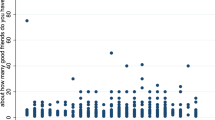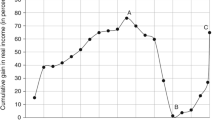Abstract
The different experience of unemployment and of poverty in the two main Western economic systems (roughly, Europe and the US) demonstrates that a simple economic approach to these problems does not exist. In this paper I deal with the question of the impact of technological change on productive activities, employment and income distribution.
The main idea is the following: technological progress may lead to an impoverishment of the disadvantaged people in a free-market society, as a consequence of their inability to adjust their skills to the new requirements of the labour market. By contrast, a just society, grounded on moral principles, recognizes that the distributive criterion has to take into account not only individual contributions to production, but also the relative needs of the individuals. In that context, everyone should be better off after a technological change, since it is fair that everyone gains some advantage from a generalized improvement in the productive conditions of society. A policy that adopts this perspective should provide an effective guard against the danger of social exclusion that strikes modern societies.
Similar content being viewed by others
References
Bernstein, B.: 1975, Class, Codes and Control (Routledge and Paul Kegan, London).
Blau, P. and O. D. Duncan: 1967, The American Occupational Structure (Wiley, New York).
Brock, H.: 1979, 'A Game Theoretical Account of Social Justice', Theory and Decision 11.
Gauthier, D.: 1986, Morals by Agreement (Oxford University Press, Oxford).
Giddens, A.: 1993, Sociology (Polity Press, Cambridge).
Goldthorpe, J. H., C. Llewellyn and C. Payne: 1980, Social Mobility and Class Structure in Modern Britain (Oxford University Press, Oxford).
Hamlin, A.: 1986, Ethics, Economics and the State (Wheatsheaf, Brighton, St. Martin Press, New York).
Hamlin, A.: 1989, The Good Polity, Hamlin and Pettit eds. (Basil Blackwell, Oxford).
Harsanyi, J.: 1977, Rational Behavior and Bargaining Equilibrium in Games and Social Situations (Cambridge University Press).
Hobbes, T.: 1986, Leviathan (Penguin Classic, London) (Edited by C. B. Macpherson, first published 1651).
Lipset, S. and M. Bendix: 1959, Social Mobility in Industrial Societies (University of California Press, Berkeley).
OECD: 1994, Jobs Study (Paris).
Rawls, J.: 1971, A Theory of Justice (Harvard University Press, Cambridge, Mass.).
Sacconi, L.: 1991, Etica degli affari (Il Saggiatore, Milano).
Sen, A.: 1985, Commodities and Capabilities (North Holland, Amsterdam).
Author information
Authors and Affiliations
Rights and permissions
About this article
Cite this article
Grimalda, G. Participation Versus Social Exclusion. Journal of Business Ethics 21, 269–279 (1999). https://doi.org/10.1023/A:1006267131045
Issue Date:
DOI: https://doi.org/10.1023/A:1006267131045




